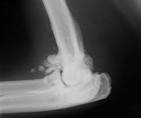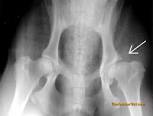Valley Veterinary Hospital, PC
(303)776-0234
www.valleyvethospital.net
|
Arthritis and Your Pet What is arthritis? Arthritis is defined as "acute or chronic inflammation of a joint" and can affect any joint in the body from tiny toe joints to bigger hip and shoulder joints. It is also known as degenerative joint disease or DJD. What this can mean for your pet is pain that ranges from mild to debilitating, and can get increasingly worse. Because our pets can be very stoic by nature, the signs we see from them may be very subtle but this, by no means, indicates the level of discomfort they feel. There are several known causes of DJD. DJD can be caused by a congenital abnormality of the joints, such as hip dysplasia which is improperly formed hip(s) at birth. DJD can also be a result of trauma and/or abnormal wear on joints or cartilage and can cause abnormal bony changes or growth in or around the affected joint.. A young animal that experiences trauma to a joint, such as a broken leg affecting the joint, may very well develop arthritis in that joint. Likewise, a pet who has experienced trauma to one limb or side of the body, and is forced to carry himself using mostly another extremity, may develop arthritis in the joint(s) of the extremity that is bearing all the weight due to increased and unbalanced use of that limb. Most commonly, arthritis can be seen in our older pets and forms over the years as the joints and cartilage age. As I mentioned earlier, due to the nature of our pets, they sometimes don't show us clear signs that they are in pain or uncomfortable in any way. Some of the subtle signs of pain that we may notice are decreased levels of activity and slight lameness or a stiff gait. They may be slower, or struggle, to get up when they're lying down and sometimes are completely unwilling to try. Our canine companions may pant when we can't find an obvious reason that they should be panting or they may tremble. We may notice that our feline pets are not jumping up on the furniture or their favorite "higher ground" spots like they used to. Conversely, we may also see outright signs that our pet is in pain such as whining, crying out, noticeable lameness or complete non-weight bearing on the affected limb. Although arthritis is a common condition, the pain our pets experience from this should never be thought of as "normal", as we tend to think this sometimes if the arthritis is due to our pets increasing age. It's important to remember that age is not a disease and there are many options available to us to help alleviate our pets arthritic pain, thus increasing their quality of life and happiness. While there is no cure for arthritis, we can effectively manage the pain our pets suffer and significantly decrease that pain while increasing their quality of life. We have chosen to spotlight arthritis during the month of December because, with the cold weather, arthritic pain can definitely worsen, thus giving us a very good reason to bring awareness to this condition and the options we offer to treat your pet during this time. Oral anti-inflammatory and pain medications were once the main treatment option for arthritic pain in our pets but this is no longer the case. While prescription medication is still on the list of treatment options for arthritic pain, we also offer other modalities that can effectively treat and manage your pets arthritic pain. Because, like us, every pet is different, the best treatment plan for your pets arthritic pain will start with a physical exam by your veterinarian and, possibly, x-rays to help determine the extent of the arthritis. With this knowledge, your veterinarian will work with you to establish a treatment plan that may involve diet and exercise changes, physical therapy, prescription medications, laser therapy and oral vitamin, mineral and omega fatty acid supplements. For severe arthritis, a local injection into the joint may be an option for your pet. If you suspect your pet may be suffering from arthritis or if you would like to discuss a more extensive treatment plan for your arthritic pet, call our office today to schedule an exam and consultation for your pet so that we can work together to give your pet a better and less painful quality of life. Arthritis treatment options may include:
|





